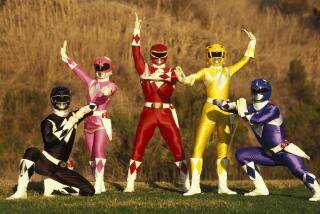Study Finds ‘Power Rangers’ Stirs Aggression
- Share via
After spending two afternoons watching elementary school children play, two undergraduate Cal State Fullerton researchers have a warning for parents: Allowing your children to watch “Mighty Morphin Power Rangers” can be dangerous to other childrens’ health.
The researchers reported that children exposed to a “Power Rangers” episode immediately responded by harassing playmates with karate kicks and aggressive shoves.
Children who did not watch the single episode of the Fox mega-hit did nothing worse than take other youngsters’ crayons in the hour after the show, the observers found in their two-day study last fall.
“One of the scary things about violence in the media is it gives children new ideas about how to be aggressive and be violent,” said assistant professor Chris Boyatzis , a member of the Cal State Fullerton Child Development Department, who oversaw the study.
“I think parents need to observe what their children are watching,” said Kristen Nesbitt, a 23-year-old undergraduate who will submit the results of what began as a simple class project for publication in a psychology journal. “A lot of times kids take what they see on TV out to the real world.”
What millions of kids see each week on “Power Rangers” is five teen-agers “morphing” into super-heroes who use karate chops and magic swords to conquer monsters sent to Earth by Rita Repulsa, the Empress of Evil.
The show’s creators at Saban Entertainment deny that it makes youngsters violent, saying that each episode concludes with a positive message and that children who watch the live-action show know the fight scenes are just fantasy. A publicist for the producer declined further comment, saying he had not yet seen the study.
In October, Nesbitt and Gina Matillo, another undergraduate studying child development, split 52 after-school day-care students at Brea’s Mariposa Elementary School into two groups.
They showed one group of the 6- to 11-year-olds a 23-minute episode of “Power Rangers” that contained 140 aggressive acts, according to their count. Then the researchers watched the children play indoors as they waited for their parents.
The next day, the researchers watched the second group playing with the same toys in the same room, but without having first seen “Power Rangers.”
The students watched each child in the two groups for two minutes apiece, logging acts of aggression, including karate moves, hitting, pushing, and stealing. They found that the children who had watched “Power Rangers” were aggressive six times more often than the children who had not.
The children who had watched “Power Rangers” imitated the martial arts sequences down to specific kicks, somersaults and arm movements--even echoing the sounds that the characters made, the researchers reported.
More to Read
Sign up for Essential California
The most important California stories and recommendations in your inbox every morning.
You may occasionally receive promotional content from the Los Angeles Times.










